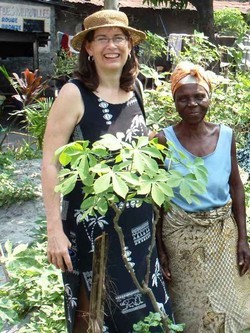We live very close to the Congo River where the rapids start. They are some of the most powerful rapids in the world. As you look out over this section of the Congo River you see these massive whirlpools form that spiral around with tremendous force. These whirlpools sort of depict the hunger situation in Congo.
Congo has one of the highest hunger indexes in the world. Eleven percent of children under five years of age in Congo are acutely malnourished and 43 percent are chronically malnourished. Addressing malnutrition early is really important as after the age of two the effects of under-nutrition are largely irreversible. The critical window to prevent malnutrition is 1,000 days, from conception to 24 months.
The causes of malnutrition in Congo are complex and intertwined; cultural feeding habits, lack of nutrition education, lack of family planning, very little agriculture research and extension, decreasing soil fertility and increasing population, limited fuel sources for cooking, increasing transportation costs and food costs.
Donor aid has typically been oriented toward treating symptoms (feeding programs) versus preventative activities. And sometimes these inadvertently convey a message to communities that the only solution to malnutrition comes in a package of food provided by the government or an NGO. Like the massive whirlpools that form on the Congo River, pulling everything in and down, all these factors combined have created a critical situation.
One of the components of the Access to Primary Health Care (ASSP) project is nutrition. It is an important component given that approximately 48 percent to 60 percent of childhood mortality is related to malnutrition.
I am working on the nutrition component together with two colleagues, Kabalosh, a nutritionist, and Mbuyi, an agriculturist. Today, through the ASSP project, we have an opportunity to take lessons learned over the past 25 years of working with nutrition and urban gardening in Kinshasa and expand our approach that interfaces nutrition and agriculture.
It will be rolled out in 878 health centers and communities in four different provinces of Congo over the next two years. Over 8,787 community volunteers will be trained in nutrition, home gardening and case management of families with malnourished children. We hope to reach 165,000 acutely malnourished children and 450,000 chronically malnourished children and their families.
Through the CPK garden program families get assistance with tools and seeds to help them start gardening.
In the process of developing the nutrition component of the ASSP project, we have had the opportunity to work with the staff of PRONANUT (the national nutrition program of the ministry of health).
When we initially explained our approach to PRONANUT we got a cool reception. They were used to NGOs and projects coming in and just doing feeding programs, and that was not our focus. Our focus was nutrition education and helping families have better food security by promoting home gardens.
It took several meetings before they caught the vision, but now they are excited about this approach and have adopted several of our strategies. Our approach falls at a good time. The Congolese government has recently signed on to the global SUN movement, “Scaling Up Nutrition,” which recognizes that the causes of malnutrition are varied, that it will take initiatives across multiple sectors to reduce malnutrition, and that reducing malnutrition must become a national priority.
Recently Kabalosh and Mbuyi were training community volunteers from health centers in Orientale Province in nutrition and home gardening. As they talked more and more about gardens, the groups started noting all the benefits that a good home garden could have for their families. By the end of the discussion they had decided that the type of home garden we were promoting should be called a “Solution Garden” because it has the potential to resolve many programs Congolese families face.
A community volunteer told Kabalosh at the end of one of the trainings that the nutrition activities of ASSP “give us hope that they can play a part in helping Congo get out of the whirlpool.”
The volunteer added: “We thought you came to give us something. Now we understand that you came to help us see what we already have and use what we have to find solution to our problems.”
This term I have my work cut out for me with the nutrition component of the ASSP project. I will also once again assist the nutrition/garden program of the Presbyterian Community of Kinshasa (CPK). And I hope to help both the CPK and the CPC (Presbyterian Community of Congo) think through how we can “Scale up Nutrition” across the different activities and ministries of the churches.
If you would like to support nutrition and home gardening efforts in Kinshasa, please consider giving to the CPK garden program. Over the years Mbuyi, Kablosh, and I have seen how nutrition education and home gardens have changed lives, helping children regain their health and giving families a step up on the economic ladder. Your financial support can be sent to Presbyterian World Mission, P.O. Box 643700, Pittsburgh, PA 15264-3700. On the memo line please write: E864826 Kitchen Gardens Kinshasa. (Or use this link to give online.)
Thank you for your prayers and financial support, which make it possible for Larry and me to work in Congo. Thank you for your interest in what God is doing through our partnership with the CPK and the CPC. We hope you will continue to make this work a part of your ministry through prayer and correspondence, through learning and sharing, and through your financial gifts for our sending and support. Together may we remain in Christ and bear much fruit for his glory.
Larry and Inge Sthreshley are mission co-workers in the Democratic Republic of the Congo. The serve at the invitation of Presbyterian Community of Congo (CPC) and the Presbyterian Community of Kinshasa (CPK); seconded to IMA World Health (Larry); and with the Methodist Presbyterian Hostel (Inge).

